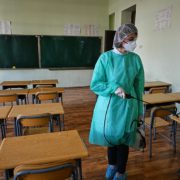
Various research reports and articles, including our own, demonstrate that the burden of the school lockdown and online learning has caused considerable challenges in Georgia’s education system. Despite the government’s quick and rapid initial transition to online schooling, deserving praise by the by the Head of OECD Education Directorate, teaching and learning has suffered considerably, mostly so for the vulnerable.
The research projects agree that in Georgia that the groups whose education suffered the most during the pandemic were socio-economically vulnerable groups: rural population, poor population, ethnic minorities, children with special education needs, children with multiple siblings. This was caused mainly by their lack of access to digital resources (quality internet or internet in general, adequate amount and quality of digital devices) to access online classes. While those with all the proper equipment and resources were keeping up with the studies, expanding their access to educational resources and digital skills, those lacking the means to get online education lagged behind not only in school education, but also in the digital skills – exacerbating the digital divide.
However, teachers and researchers state that the education has suffered losses in general. With the shortened study time (shortened school lesson time and homework time), decreased student attendance, stressful home conditions, covid anxiety, generally decreased motivation to engage, difficulty of transitioning classroom teaching to online teaching, resulted in significant learning losses.
The losses are of different nature and size based on the subject group and education level. Teachers speak of losses in all subjects and levels, but most visible in maths and physics, reading and numerical skills in primary school, and base level subjects that students first started to learn online. Teachers and parents report less learning losses for higher grade students, as at this age they are more able to organize their studies independently and have already had basic education.
With the third year into the pandemic and online/hybrid teaching approaching, analysis of learning losses are still of qualitative nature. More systematic, quantitative and measurable approach needs to be taken in order to assess the critical points of loss – the school subjects, the vulnerable groups, and the schools – in order to design restorative policies and practices and minimize the educational gaps exacerbated by the pandemic.